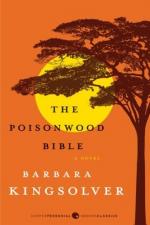|
This section contains 858 words (approx. 3 pages at 300 words per page) |

|
SOURCE: “Daughters of Africa,” in Times Literary Supplement, February 5, 1999, p. 21.
In the following review, Hussein offers favorable assessment of The Poisonwood Bible.
The Poisonwood Bible, the fourth and the most ambitious novel by Barbara Kingsolver, begins in 1959 and proceeds to cover three decades of the turbulent and tragic history of Zaire: before, during and after independence. History, to many contemporary writers, has meant the nostalgic reworking of canonical texts; others, like Margaret Atwood and Timothy Mo, have renamed countries and personages in the Caribbean or in South-East Asia, claiming fictional licence to unveil true stories. Kingsolver takes the risk of locating her book in the real terrain of documented events; she includes at its end an impressive bibliography. Though the offstage rise and betrayal of Patrice Lumumba adds a crucial moral element to the construction of the novel, the author nevertheless succeeds in making the human dimension of...
|
This section contains 858 words (approx. 3 pages at 300 words per page) |

|


